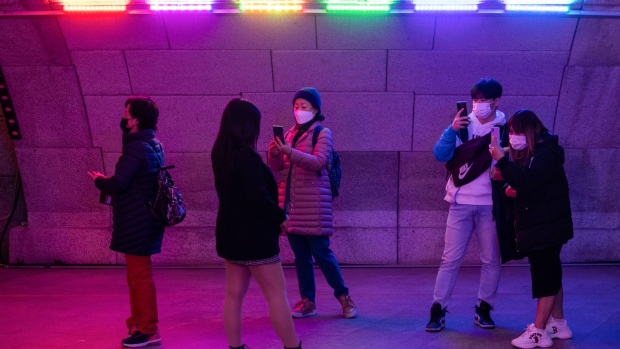Dec 2, 2021
South Korea Takes Measured Step to Stem Surge as Omicron Arrives
, Bloomberg News

(Bloomberg) -- With a record number of Covid cases and the emergence of the omicron variant, South Korea was expected to reinstate strict social distancing measures to stem the latest Covid surge.
But instead, the prime minister on Friday urged the country to work from home and not move around too much. The only new restriction he announced: No more than six people can gather, down from 10 currently, in the greater Seoul area. High-risk businesses such as nightclubs and bars will remain open.
The measured step parallels moves made by other Asian nations trying to avoid returning to days of lockdowns and containment rules that hampered their economies and frustrated the public -- despite resurgence of the virus and the emergence of the omicron variant.
“We cannot stop or give up on the daily recovery that everyone has longed for,” Prime Minister Kim Boo-kyum said during a Covid response meeting Friday. “Our people have successfully overcome many crises by demonstrating the spirit of solidarity and cooperation. Now, we need to pour that strength into overcoming the December crisis.”
An Early Covid Rockstar Hits a Rough Patch
Like its Asian neighbors, South Korea has been reluctant to take drastic steps that would hurt its economy, particularly mom-and-pop restaurants and businesses. Instead, the government has made pleas such as the one from the prime minister Friday, urging the public to take preventive measures including getting booster shots, working from home if possible and canceling or postponing meetings and events.
The government’s muted response comes as the country reported its first omicron variant infection late Wednesday. A couple returning from a visit to Nigeria tested positive for Covid-19. Subsequent genome tests confirmed they, along with their child and two acquaintances, were infected with the omicron variant.
Also this week, the number of daily new Covid cases surged to a record - topping 5,000 for the first time - with those in critical condition surpassing 700. Severe cases set another record on Thursday.
The latest surge is a setback for a country that has been lauded as a model for containing the outbreak without a lockdown. South Korea eased social distancing measures for a “gradual return to normal life” from last month after resisting harsh measures and working to prevent severe damage to the economy by managing outbreaks with targeted quarantine restrictions.
Most vaccinated
In July, when the number of new cases doubled to more than 1,600 a day, the country imposed strict distancing measures, including limiting gatherings to no more than two people.
Even though daily new cases rose to more than 2,000 and stayed in that range, Korea eased the restrictions on Nov. 1, citing the high vaccination rate and the economic necessity of propping up restaurants suffering from the prolonged pandemic.
After a slow start due to supply shortages, Korea stepped up vaccinations and is now among the world’s most vaccinated with about 80% of the population fully inoculated.
Relatively low rates of severe illness and death bolstered the government’s argument for relaxing restrictions. That allowed as many as 10 people to dine together, and sports teams to once more fill their stadiums with spectators.
The easing brightened the country’s economic outlook, which had struggled through the darkest days of the pandemic-induced restrictions.
South Korea’s exports are on track to hit an annual record, buoyed by year-end holiday demand and higher product prices even as supply chain bottlenecks continued to pressure manufacturers. Exports rose 32.1% in November from a year earlier to $60.4 billion, a monthly record, data from the trade ministry showed Wednesday.
©2021 Bloomberg L.P.